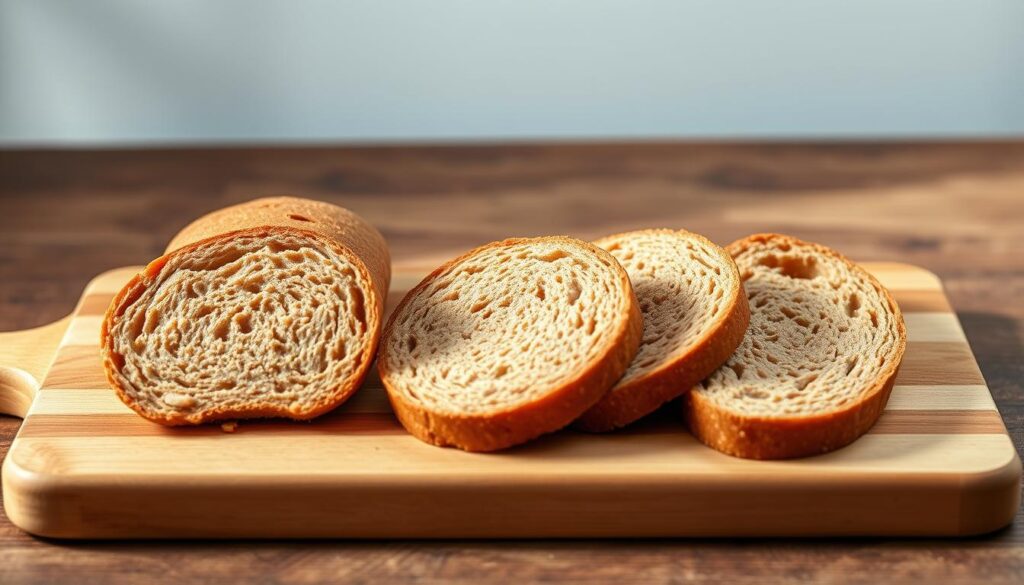Table of Contents
Can Dogs Eat Wheat Bread
Every dog owner has felt that guilty moment when their puppy looks up with pleading eyes. They want a bite of your sandwich. But, can dogs safely eat wheat bread? The answer isn’t straightforward.
I love dogs and know how important it is to keep them safe. To ensure their health, we need to know what’s safe for them. Feeding your dog wheat bread can be tricky, and it’s key to do it right.
Is wheat bread okay for dogs? Dogs can have wheat bread in small amounts, but there are things to consider. Not all breads are the same, and what looks harmless might be risky for your dog.
Key Takeaways
- Wheat bread is generally safe in small quantities
- Plain bread is preferable to flavored varieties
- Watch for potential allergic reactions
- Bread should never replace balanced dog nutrition
- Consult your veterinarian about specific dietary concerns
Understanding Wheat Bread and Its Ingredients
When thinking about wheat bread for dogs, it’s key to know what’s in it. Wheat bread is not just a simple treat. It has many ingredients that can affect your dog’s health.
What is Wheat Bread Made Of?
Wheat bread is made from ground wheat kernels. These kernels have bran, germ, and endosperm. Each part adds different nutrients that can impact your dog’s diet.
Nutritional Value of Wheat Bread
Wheat bread does offer some nutrients. But, it’s not very good for dogs. Dogs need protein, and bread has mostly carbs. Here’s what wheat bread usually has:
| Nutrient | Amount per Slice | Relevance for Dogs |
|---|---|---|
| Carbohydrates | 15-20g | High energy, but not essential |
| Protein | 3-4g | Low nutritional impact |
| Fiber | 2-3g | Moderate digestive support |
Potential Allergens in Wheat
Many dogs have wheat allergies. These allergies can cause skin issues or stomach problems. Signs of wheat allergy include:
- Itchy skin
- Ear infections
- Gastrointestinal discomfort
- Chronic inflammation
Knowing about these ingredients and reactions helps you decide if wheat bread is right for your dog.
Can Dogs Digest Wheat Bread?
It’s important for pet owners to know how dogs digest bread. Dogs can eat wheat bread, but there are things to keep in mind.
Dogs and humans digest food differently. Dogs can eat wheat bread, but they mainly need protein.
Canine Digestive System Basics
Your dog’s digestive system is unique. It’s designed for meat, not carbs. Here’s why:
- Shorter digestive tract optimized for meat protein
- Less efficient carbohydrate breakdown
- Quick food transit time
Raw vs. Cooked Wheat Products
Cooked wheat products are safer for dogs than raw ones. Raw wheat can upset their stomachs and cause blockages.
When dogs eat bread, consider these factors:
- Cooking method
- Bread ingredients
- Individual dog’s metabolism
Wheat bread should be a rare treat, not a regular part of their diet. Always introduce new foods slowly and watch how your dog reacts.
Health Benefits of Wheat Bread for Dogs
When thinking about wheat bread for dogs, it’s key to know its nutritional value. Whole grain bread can bring some health perks when given in small amounts. It’s a good idea to give your dog wheat bread dog treats as an occasional snack. But remember, it’s not a main food source.
- Dietary fiber for digestive health
- Complex carbohydrates for energy
- Small amounts of essential minerals
- Trace vitamins from whole grain ingredients
Fiber Content and Its Importance
Whole grain bread gives dogs dietary fiber, which is great for digestion. Fiber helps regulate intestinal movements and keeps the digestive system balanced. Dogs need the right amount of fiber based on their size, age, and health.
Essential Vitamins and Minerals
Wheat bread dog treats have some good nutrients. Whole wheat types might have:
- B-complex vitamins
- Selenium
- Manganese
- Small protein quantities
Remember, wheat bread should never replace balanced, species-appropriate dog nutrition.
Even though these nutrients are present, they’re not enough to make wheat bread a main food for dogs. Always talk to your vet before adding new foods to your dog’s diet.
Risks of Feeding Wheat Bread to Dogs
Wheat bread might seem like a safe snack for dogs, but it’s not without risks. Dogs can face health issues if they eat wheat bread, especially if they’re sensitive or have dietary needs.
Many pet owners don’t know that dogs can have wheat allergies. These allergies can harm a dog’s health and happiness.
Common Allergic Reactions in Dogs
When thinking about wheat bread for dogs, watch out for these signs of allergy:
- Persistent skin itching and rashes
- Chronic ear infections
- Digestive discomfort
- Gastrointestinal upset
- Excessive licking or scratching
Risks of Overconsumption
Eating too much wheat bread can harm dogs. Moderation is crucial when adding new foods to their diet.
“Not all dogs metabolize wheat products the same way. Always consult with your veterinarian before making significant dietary changes.” – Veterinary Nutrition Expert
Dogs with wheat allergies might face even bigger problems, like:
- Nutritional imbalances
- Potential weight gain
- Increased inflammation
- Compromised immune system response
Knowing your dog’s dietary needs and sensitivities is vital. It helps keep them healthy and avoids problems from wheat bread.
How to Safely Introduce Wheat Bread to Your Dog
Introducing wheat bread to your dog needs careful steps. Many dogs can have small amounts of wheat bread. But, pet owners must follow certain guidelines for their dog’s safety.
Before adding wheat bread to your dog’s diet, consider these essential steps:
- Choose plain, unseasoned wheat bread without added ingredients
- Remove crusts and cut bread into tiny pieces
- Avoid bread with potential toxic ingredients like raisins or nuts
Starting with Small Portions
When giving wheat bread to dogs, portion control is key. Start with very small amounts based on your dog’s size and weight. Smaller dogs need even smaller pieces than larger breeds.
| Dog Size | Recommended Bread Portion |
|---|---|
| Small Dogs (under 20 lbs) | 1/4 to 1/2 inch piece |
| Medium Dogs (20-50 lbs) | 1/2 to 1 inch piece |
| Large Dogs (over 50 lbs) | 1-2 inch piece |
Observing for Adverse Reactions
Watch your pet closely after introducing wheat bread. Look for signs of trouble like:
- Digestive discomfort
- Excessive gas
- Skin irritations
- Changes in bathroom habits
Pro tip: If your dog shows any unusual symptoms, stop wheat bread right away. Then, talk to your vet.
Alternatives to Wheat Bread for Dogs
Looking for wheat bread dog treats? There are many healthy options for your furry friend. Not all dogs can handle wheat well, so it’s important to find other treats.

Dogs with sensitive stomachs or wheat allergies need special food. Whole grain bread might not be the best choice for them. So, finding other treats is key.
Gluten-Free Options for Canine Nutrition
Here are some safe alternatives to wheat bread:
- Rice cakes (plain, unsalted)
- Sweet potato chews
- Pumpkin-based treats
- Oat-based snacks
Nutritious Treat Alternatives
Here are healthy options that offer similar benefits:
| Food Option | Nutritional Benefit | Serving Size |
|---|---|---|
| Carrots | Low calorie, high fiber | 1-2 small pieces |
| Blueberries | Antioxidant-rich | 3-4 berries |
| Apple slices | Vitamin C, fiber | 2-3 small slices |
Always talk to your vet before giving your dog wheat bread treats or other snacks. Every dog is different, and what’s good for one might not be for another.
Remember: Moderation is key in introducing any new food to your dog’s diet.
Signs of Wheat Allergy in Dogs
Knowing about wheat allergies in dogs is key for pet owners. They want their pets to stay healthy. Dogs can get sensitive to wheat bread and other wheat products. This can cause various uncomfortable symptoms.
Many pet owners don’t know that wheat allergies in dogs are common. These allergies can show up in different ways. They can affect your dog’s health and comfort.
Identifying Skin Reactions
Skin symptoms are often the first signs of wheat allergies in dogs. Look out for these signs:
- Persistent itching and scratching
- Red, inflamed skin patches
- Recurring hot spots
- Unexplained hair loss
- Chronic ear infections
Recognizing Gastrointestinal Issues
Is wheat bread safe for dogs with sensitive stomachs? Not always. Gastrointestinal problems can be a sign of a wheat allergy:
- Frequent vomiting
- Diarrhea
- Excessive gas
- Bloating
- Lack of appetite
If your dog shows these symptoms after eating wheat bread, see your vet right away. Some dogs develop allergies over time. So, it’s important to watch how they react to wheat products for their health.
Always prioritize your dog’s individual dietary needs and sensitivities.
When to Avoid Wheat Bread for Your Dog
It’s important to know when to limit or avoid bread for your dog. Wheat bread might seem safe, but it’s not always good for your pet. Some health issues and life stages make it bad for them.
Specific Health Conditions That Require Caution
Some dogs face health problems that make wheat bread risky. Dogs with certain medical conditions need to be careful about eating wheat bread:
- Diabetes management requires strict carbohydrate control
- Obesity demands low-calorie dietary options
- Gluten sensitivity or wheat allergies
- Chronic gastrointestinal disorders
Age-Related Considerations for Wheat Bread
Can puppies eat wheat bread? It depends on their age and health. Young puppies have sensitive stomachs that might not handle wheat well.
For puppies, wheat bread should be:
- Introduced extremely gradually
- Given in minimal quantities
- Monitored for potential allergic reactions
Adult dogs usually do better with wheat bread, but still, it’s important to keep it in moderation. Always consult with your veterinarian before changing your dog’s diet, especially if they have health issues.
Your dog’s individual health profile should guide any dietary decisions involving wheat bread.
While dogs eating bread is sometimes okay, it should never be a main part of their diet. They need a balanced, complete diet made just for dogs.
Recommended Serving Sizes of Wheat Bread for Dogs

When thinking about bread for dogs, knowing the right amount is key. Wheat bread can be a fun treat sometimes. But, it’s important to keep an eye on how much you give to keep your dog healthy.
Feeding wheat bread to dogs needs careful thought. It depends on their size and what they need to eat. Not all dogs handle bread the same way, so the amount you give can vary.
Serving Guidelines by Dog Weight
- Small Dogs (under 20 lbs): 1-2 small pieces, no larger than a thumb
- Medium Dogs (20-50 lbs): 2-3 small pieces, about bite-sized
- Large Dogs (50-90 lbs): 3-4 small pieces, carefully monitored
- Giant Breeds (over 90 lbs): 4-5 small pieces, sparingly
Moderation Matters
Can dogs eat wheat bread? Yes, but only a little. Wheat bread should not be a main part of their diet. It should make up no more than 10% of their daily calories. Treats, like bread, should be given out no more than once or twice a week.
Remember: Every dog is unique. Always consult with your veterinarian about specific dietary recommendations.
When you first give wheat bread to your dog, start with a tiny bit. Watch for any signs of trouble. Some dogs might have tummy issues or allergies to wheat.
Frequently Asked Questions About Dogs and Wheat Bread
Pet owners often wonder if they can feed wheat bread to their dogs. It’s important to know the details about can dogs eat wheat bread for their pets’ health. Let’s look at some common questions dog owners have.
Can Wheat Bread Help with Constipation?
Wheat bread might help with mild digestive problems in dogs. The fiber in whole grain bread can help with bowel movements. But, it’s not a sure fix. If your dog has ongoing constipation, see a vet.
- Small amounts of wheat bread may provide dietary fiber
- Fiber can help promote healthy digestion
- Not a substitute for professional veterinary advice
Is Whole Wheat Better Than White Bread?
Whole grain bread, like whole wheat, is better for dogs than white bread. It has more nutrients and fiber. This makes it a slightly better choice for dog treats.
“Moderation is key when introducing any human food to your dog’s diet.” – Veterinary Nutrition Experts
Whole wheat and white bread differ in several ways:
- Whole wheat has higher fiber content
- More natural nutrients remain intact
- Lower processed sugar levels
While wheat bread can be a treat, it should not replace a dog’s regular diet. Always introduce new foods slowly and watch for any bad reactions when trying can dogs eat wheat bread options.
Best Practices for Feeding Your Dog Table Scraps
It’s tempting to share food with your furry friend. But, pet owners must be careful with dogs eating bread and wheat bread dog treats. Not all human foods are safe for dogs, and knowing the right approach is key for their health.
Here are some important guidelines to keep your dog healthy and happy:
- Always check bread for mold or unusual signs before sharing
- Introduce new foods gradually and in small portions
- Watch for any allergic reactions or digestive issues
- Limit treats to less than 10% of your dog’s daily calorie intake
Tips for Healthy Snacking
Wheat bread dog treats can be a good snack if done right. Plain, unseasoned bread is best. Moderation is key when giving human foods to your dog.
Foods to Avoid
Some human foods are dangerous for dogs. Avoid these harmful items:
- Chocolate
- Onions and garlic
- Grapes and raisins
- Bread with added ingredients like nuts or seeds
- Processed or seasoned breads
Always talk to your vet before changing your dog’s diet. Each dog is different, and what’s good for one might not be good for another when it comes to bread.
Conclusion: Making the Best Choice for Your Dog
Deciding if wheat bread is right for your dog needs careful thought. Is wheat bread safe for dogs? It’s not a simple yes or no. Pet owners must think about their dog’s special diet needs and health.
Understanding what your dog needs is key when thinking about bread. Some dogs can handle wheat bread, but others might have allergies or stomach issues. Always talk to your vet for advice that fits your dog’s health.
Commercial dog foods and treats are made to give the right nutrition. Wheat bread should not be a substitute for these. If you do give wheat bread, give small amounts and watch how your dog reacts.
Your dog’s health is in your hands. Get advice from your vet, watch for signs of allergies, and choose plain wheat bread without added sugars or harmful stuff.
FAQ
Can dogs safely eat wheat bread?
Dogs can have wheat bread in small amounts. But it should not be a big part of their diet. Plain wheat bread is usually safe. Still, watch for any bad reactions, especially if your dog is sensitive.
Is whole wheat bread better for dogs than white bread?
Whole wheat bread has more fiber and nutrients than white bread. But, it’s still not a good replacement for a balanced diet. Always pick plain bread without added sugars or harmful ingredients.
How much wheat bread can I give my dog?
Treats like wheat bread should not make up more than 10% of your dog’s daily calories. Small dogs might get a quarter slice, while bigger dogs could have half a slice. Always check with your vet for the right amount for your dog.
Can wheat bread help with my dog’s constipation?
Bread has some fiber that might help with mild digestive issues. But, it’s not a good fix for constipation. If your dog has ongoing digestive problems, see your vet for help.
What are signs of wheat allergies in dogs?
Signs of wheat allergies include skin problems, itching, ear infections, and stomach issues. If your dog shows these signs after eating wheat bread, stop giving it to them and talk to your vet.
Are there safer alternatives to wheat bread for dogs?
Yes, there are safer options like dog treats, plain rice cakes, or gluten-free foods. Carrots or cucumber are also good, low-calorie choices that are better for your dog’s health.
Can puppies eat wheat bread?
Puppies have sensitive stomachs, so it’s best to avoid wheat bread. They need different nutrients, and extra ingredients can cause problems or affect their growth.
Is homemade wheat bread safer for dogs?
Homemade wheat bread can be safer because you can avoid bad additives. But, it should still be given in small amounts and only as an occasional treat.
Can wheat bread cause weight gain in dogs?
Yes, bread is high in carbs and calories. Eating it regularly can lead to weight gain, especially in less active dogs. Always keep an eye on your dog’s calorie intake and follow your vet’s diet advice.
There are no reviews yet. Be the first one to write one.

